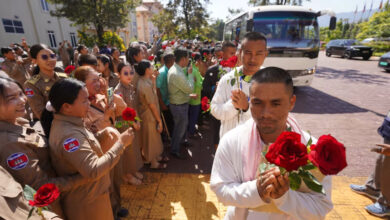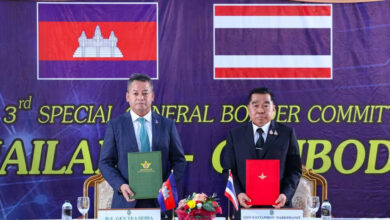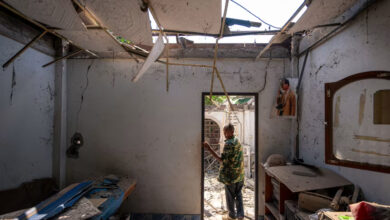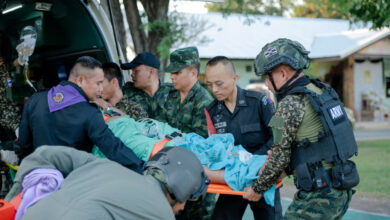Bangkok–Anti-government protesters, showing little sign of wearing down after seven weeks of protests, said Saturday that supporters from around the country were sending reinforcements to fortify their encampment in the Thai capital.
With negotiations between the protesters and the government on hold and hopes for a peaceful end to the standoff dwindling, calls grew for international mediators to be brought in to bridge the gap between the two sides.
The protesters have barricaded roads and paralyzed much of the city’s commercial center for weeks in a campaign to force the government to disband parliament and call elections. At least 27 people have been killed and nearly 1,000 wounded in ensuing violence between protesters and security forces.
Some officials have expressed hopes the protesters will grow weary and go home soon, but Weng Tojirakarn, a Red Shirt leader, said they planned to beef up their presence in the streets of the capital.
“Red Shirts, people from the provinces, are coming in to Bangkok, starting from today. And this time they will stay a long time,” he said.
The Red Shirts, drawn mostly from the rural and urban poor, are demanding the resignation of Prime Minister Abhisit Vejjajiva, saying he came to power through the connivance of Bangkok’s elite bureaucrats and the military.
As the crisis dragged on, the International Crisis Group think tank appealed for foreign mediation, possibly led by East Timor President Jose Ramos Horta, to encourage both sides to stand down and help prepare for new elections and a government of national unity.
“It is time for Thailand to consider help from international friends to avoid a slide into wider violence. Even the most advanced democracies have accepted this,” the think tank said in a statement.
The government has repeatedly rejected efforts to bring in foreign mediators.
“This is a domestic situation with sensitivities and complexities that the international community may not be fully aware of,” said government spokesman Panithan Wattanayagorn.
New York-based Human Rights Watch also called on the protesters and security forces to end the violence.
“All sides need to rein in their supporters, order the attacks to stop and negotiate a political solution before the situation escalates,” said Brad Adams, Asia director at Human Rights Watch.
State Department spokesman P.J. Crowley said Wednesday that U.S. diplomats were “intensively engaged in discussions” with Thai government officials and opposition forces, and E.U. diplomats said they have met with opposition figures as well.
Foreign Minister Kasit Piromya censured some foreign diplomats for meeting with Red Shirt leaders this week. “We do not want to see that happening again,” Kasit told reporters.
The Red Shirts have drawn fire in recent days for breaking into a hospital in the protest zone, prompting medical officials to evacuate patients.
The incident exposed a possible rift among the protest leaders, some of whom tried to make amends by removing barricades blocking the hospital only to be overruled by others who had them restored.
The government also has stepped up accusations the protesters were trying to undermine the monarchy — which the Red Shirts deny — and said Friday that a grenade attack last month near the Defense Ministry was actually targeting one of the country’s most sacred Buddhist shrines.
World




